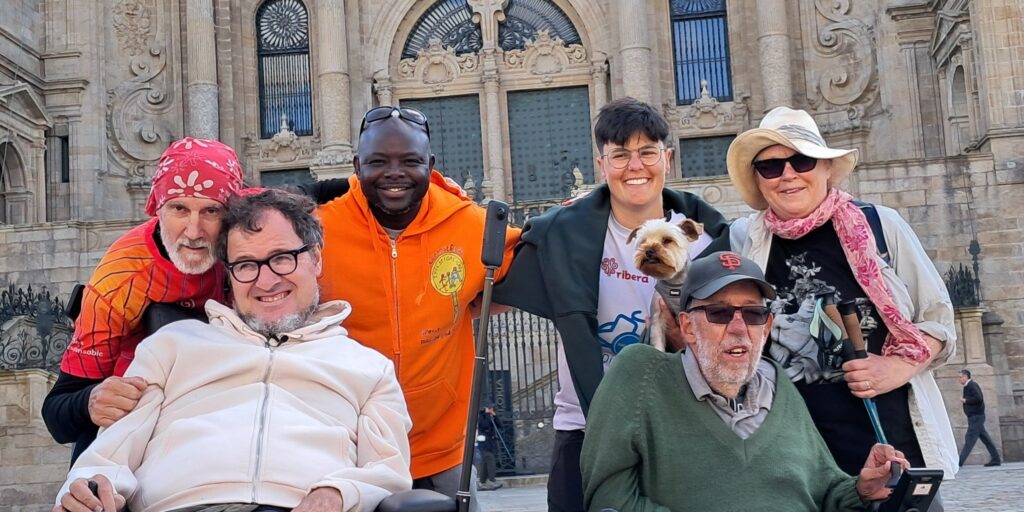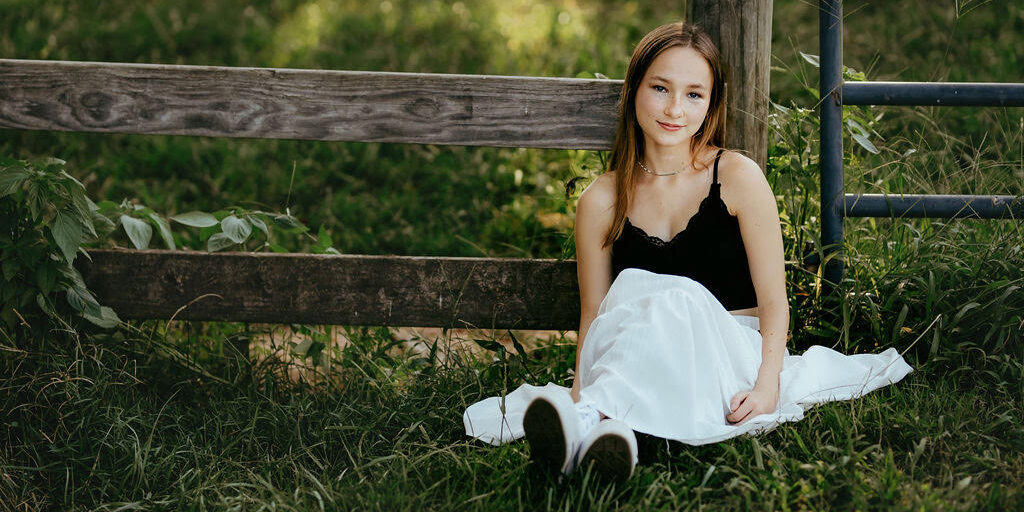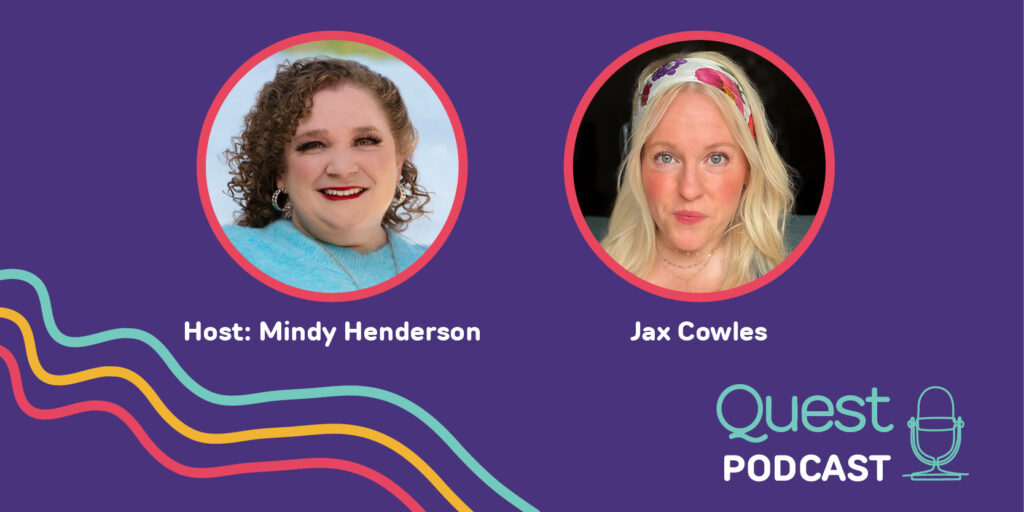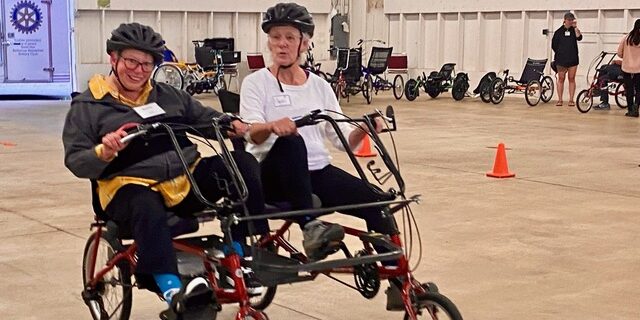
MDA Ambassador Guest Blog: How Making an Impact Renewed My Purpose After FSHD Diagnosis
By Ranae Beeker | Friday, June 13, 2025
5 Second Summary
MDA Ambassadors play an essential role in furthering MDA’s mission while representing and empowering the neuromuscular disease community. Quest Ambassador Guest Blog series provides a platform to share their personal stories, perspectives, and experience.
Ranae Beeker, who is in her late 60s, has found her greatest joy in her roles as a mother to Alethea and Gavin, and as a Gramma to Eilif and Zuzu. Ranae’s journey to diagnosis was not without its challenges, as she underwent three misdiagnoses before finally finding answers at Johns Hopkins. where doctors confirmed her diagnosis of facioscapulohumeral dystrophy (FSHD). Ranae especially loves the quote from Margaret Meade that says: “A small group of thoughtful and committed citizens can indeed change the world, and that this is the only true force of change that has ever existed.”
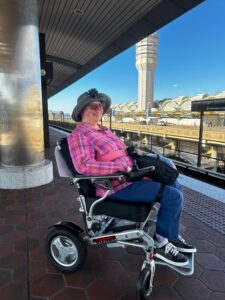
Ranae Beeker
I can’t change my diagnosis of facioscapulohumeral dystrophy (FSHD). What is within my power, however, is to learn to adapt through lifestyle changes and physical and emotional coping strategies. What has been even more powerful than these methods, has been to reach out and forge human connections that deepen my understanding and increase my joy.
Progressive diseases can feel as though they’re threatening to isolate and alienate us from our lives as they chip away at our physical autonomy. They can leave you feeling helpless and alone. But through outreach, networking, and advocacy, we can flip the entire dynamic on its head and – despite the course of our bodies – we can build community, emotional resilience, and a stronger purpose in life.
Working as a nurse for more than 40 years, I found joy and meaning in helping my patients. As my disease progressed, I was able to transfer these skills to less physically challenging roles: first as a case manager and then as a professional in the quality department. I adjusted within my career and maintained the joy and purpose that helping others brought to my life.
After my physical limitations made retirement necessary, I was faced with the daunting prospect of facing my progressing condition on my own at home. My mind itself seemed to recoil at the change of pace – to go from juggling dozens of needs at once to sitting at home in my chair was like taking an exit off the highway at 80 miles per hour. It was scary. My body agreed – I had several nasty falls at home and my son moved in to serve as my caregiver. It was a huge adjustment.
But little by little, I found nodes of connection. My decades-long interface with the Muscular Dystrophy Association and the FSHD Society offered chances to apply myself and share my gifts. Though I was sitting at home in my office on my computer, I was engaged with the world again. I began learning new ways to apply my knowledge and capabilities, making new friends, learning new skills, and (best of all) helping others and paying forward the multitudes of blessings I have experienced in my life.
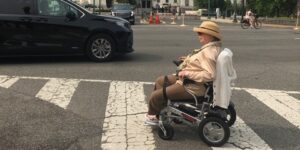
Ranae Beeker in Washington, D.C.
I was made aware of an opportunity, through the MDA, to lobby my local and national legislators. I am truly amazed by the great minds that the MDA employs. They are so knowledgeable and exquisitely positioned to make a difference. I became involved with the MDA Advocacy Team and dedicated myself to supporting positive change for the neuromuscular disease community. Now I enjoy working with them to lobby our US senators and representatives on issues that will promote important and necessary research. The skills they have taught me have helped me to continue my advocacy work at the local level. Reinforcing to myself, that indeed this ol’ nurse can learn new tricks – and with success!
I have also had the opportunity to serve the FSHD community directly. The FSHD Society identified a need to provide community and support during the pandemic and I was asked to participate. We built a group called Women on Wellness. We also built an expansive Wellness Hour for all, including families and loved ones of those affected. I have been happily running the Women on Wellness support group for about 4 years now. It is a great experience to work with our great community of women with FSHD.
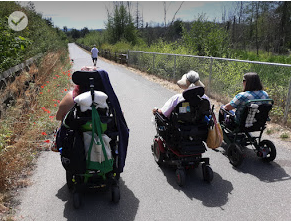
Ranae Beeker enjoying nature trails with her friends
One day while reading my local newspaper, I noticed an article about individuals in wheelchairs promoting community walks on our beautiful county trails. This group is called the Accessibility Communities Advisory Committee, which is a county-sponsored advisory group. I joined the group and have been absolutely thrilled with the great work we are able to facilitate. One of my favorite success stories with this group has been creating a “Bikes for All” event for our county. This event promotes everyone’s ability to ride a bike. We work with a local non-profit named Outdoors for All, which brings a trailer full of adaptive bikes to events and encourages everyone to try them out. Folks that believed that they wouldn’t be able to ride a bike are thrilled to discover that they can ride these adaptive bikes! I absolutely love the expressions on the riders’ faces when they realize they are actually riding independently. This event requires a great deal of work to plan and execute, but it is all worth it when we see those beaming faces.
World FSHD Day is a time to celebrate the mission of community-building, advocacy, and education. Let’s all reflect on the great work that organizations like MDA and The FSHD Society are doing to lift us up, promote community, and work towards a cure. Through them I’ve made many new friends and found a new purpose in life. I may not be able to change my diagnosis, but I can help to change the world.
Next Steps and Useful Resources
- For more information about the signs and symptoms of Facioscapulohumeral muscular dystrophy (FSHD) , as well an overview of diagnosis and treatment concerns, an in-depth review can be found here.
- Learn more about Facioscapulohumeral muscular dystrophy (FSHD) in our Simply Stated article.
- Find support for your mental health needs in MDA’s Mental Health Hub.
- To learn more about MDA’s Advocacy program, visit here.
- MDA’s Resource Center provides support, guidance, and resources for patients and families. Contact the MDA Resource Center at 1-833-ASK-MDA1 or ResourceCenter@mdausa.org
- Stay up-to-date on Quest content! Subscribe to Quest Magazine and Newsletter.
TAGS: Ambassador Guest Blog, Ambassadors, Caregiving, Community, Mental Health, Relationships
TYPE: Blog Post
Disclaimer: No content on this site should ever be used as a substitute for direct medical advice from your doctor or other qualified clinician.


